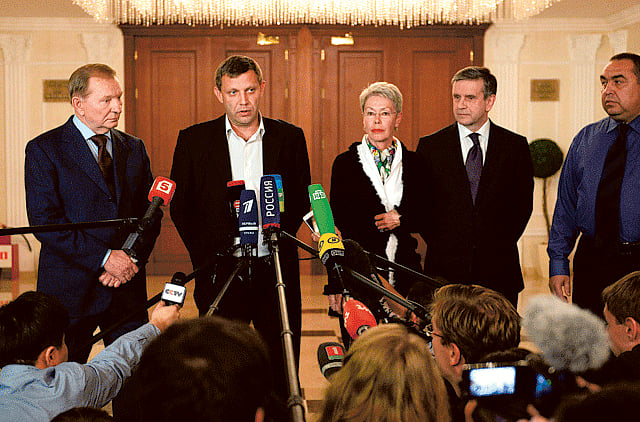Minsk, Belarus: Pro-Russia rebels said on Twitter they have signed cease-fire deal with Ukraine.
The deal was also confirmed by Ukrainian President Petro Poroshenko who said the envoys in Minsk have sign a ceasefire agreement.
The president further said an order was given to military commanders to cease their fire from 1800 on Friday.
Meanwhile in Newport, Wales, Nato leaders said they are backing plans Friday for positioning more troops and military equipment in Eastern Europe, establishing a rapid response force aimed at easing anxiety among member states near Russia's border and deterring the Kremlin against replicating its provocations in Ukraine elsewhere in the region.
The announcement came against the backdrop of peace talks involving Russia and Ukraine in Minsk, Belarus.
The talks are aimed at achieving a ceasefire to bring an end to the months of fighting between Ukrainian forces and pro-Russian separatists.
More sanctions threatened
The US and Europe have warned that they stand ready to levy more economic sanctions on Russia, a step a top White House official said could occur within days.
As leaders began their meeting in southern Wales, British Prime Minister David Cameron said his nation is willing to contribute 3,500 personnel to the rapid response force. He said its headquarters could be in Poland, with forward units in the easternmost Nato member countries and equipment stockpiled there in advance.
"We must be able to act more swiftly," Cameron said. "I hope that today we can agree a multinational spearhead force deployable anywhere in the world in just two to five days."
The creation of the force is the centerpiece of the two-day Nato gathering at a golf resort. Nato Secretary General Anders Fogh Rasmussen said the agreement "will ensure we have the right forces and equipment in the right places."
Obama and Cameron have also been pressing their Nato counterparts to follow through on commitments to spend 2 percent of their nations' gross domestic product on defense. Only four Nato nations meet that threshold: the US, Britain, Greece and Estonia.
Military budget
Cameron said Friday that it was time for the rest of the alliance to put their money where it counts.
"What matters most of all is what are we are able to do. What are we able to deploy," Cameron said. "What enables us to respond rapidly and together collectively to the threats that we face."
On the sidelines of the summit, Cameron and US President Barack Obama have been seeking support from their counterparts for a campaign to degrade Islamic State militants that have wreaked havoc in Iraq and Syria.
Both leaders had meetings planned with Turkish President Recep Tayyip Erdogan, a key regional player whose support would be crucial to defeating the militants. Obama also met Friday morning with French President Francois Hollande.
Sign up for the Daily Briefing
Get the latest news and updates straight to your inbox
Network Links
GN StoreDownload our app
© Al Nisr Publishing LLC 2026. All rights reserved.
